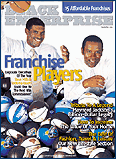Buying Businesses With Equity From your Home
By Nicole LewisBlack Enterprise
Although her parents are gifted musicians, Shauna Anderson says she knew at an early age that she wouldn't be following in their footsteps. "I never had the gift of song, and so I knew that I'd have to find another talent."
At age 15, Anderson's love of math led her to enroll in a special student program that allowed her to work at the Internal Revenue Service during the summer, earning $1.60 per hour. By the time she graduated high school, Anderson had earned a permanent job with the IRS that began her 15-year career with the agency.
The IRS taught Anderson about taxes and accounting practices, which the 50-year-old Washington, D.C., native calls great preparation for becoming an entrepreneur. Now the owner of two companies, Anderson says there was an even bigger contributor to her success than her years of experience at the IRS–her history of building wealth through real estate. Following the example of another IRS employee who worked as a part-time real estate agent, Anderson committed to Declaration of Financial Empowerment principle No. 1: to use homeownership to build wealth. It became the cornerstone of her personal finance strategy.
Anderson started by selling her two-bedroom, one-bathroom condo in 1989. She bought it seven years earlier for $42,000, sold it for $46,000, and netted $7,000, including equity. The plan was to use the proceeds of the sale to purchase properties that would appreciate in value.
The profit from the condo sale was used to purchase a $75,000 three-bedroom, two-bathroom foreclosure property through a Housing and Urban Development program. "Because I took advantage of a HUD homeownership program, I spent no more than $3,000, which included the deposit and closing costs," says Anderson. "I bought it in 1989 and sold it in 1993 for $125,000–a $50,000 profit."
Next, Anderson used $27,000 from the sale of the HUD home to buy a four-bedroom, two-bathroom house in Hyattsville, Maryland, just outside of Washington, D.C. That property, which she purchased for $134,000 in 1993, increased in market value to $325,000 within 10 years. The appreciation of the property allowed Anderson to refinance her mortgage and take $70,000 in equity out of the home to purchase more properties. She used $40,000 to buy a two-bedroom, one-bathroom brick colonial with a detached garage for $199,000, which she uses for her office. In the three years since she bought the house, its market value has jumped to $227,000.
"My office is a place that I'm building equity in, and that's always an advantage," Anderson says. "You can get some tax write-offs, and you're not spending your own money to pay rent for somebody else's office space."
Anderson then used $30,000 to buy a commercial property at a bargain price. "This was pure luck. The property is across from the West Hyattsville metro station and it was zoned as a commercial building, but apparently the owners were not aware of it," says Anderson. "They could have sold it for more."
The commercial property she bought in 2004 for $236,000 now has a market value of $500,000. She intends to spend $50,000 renovating the building, which will house a restaurant she plans to open.
The appreciation of her real estate has made it easier for Anderson to build two businesses. She left the IRS in 1986 to launch her first venture, SRA Business Services, a tax and accounting business. "I knew the business of accounting and taxes, and by working with clients, I learned the kinds of mistakes other companies make."
Anderson took on a number of construction firms as clients, a move that made making repairs on her properties easier. Last year SRA earned about $80,000. But now Anderson's main business is The Chitlin Market (www.chitlinmarket.com), which provides cleaned chitterlings nationwide over the Internet. The business, which opened in 1995, posted about $250,000 in revenues last year. "I thought it would be a little, part-time business selling meat, but it's turned out to be much larger than I expected," says Anderson.
It was Anderson's involvement in real estate that has allowed her to become an entrepreneur with multiple streams of income, increasing her overall wealth.
To duplicate her strategy, Anderson offers three pieces of solid advice:
* Stay vested in real estate. Anderson leveraged the equity in her home to develop her other businesses. She saves on overhead costs by owning her properties, which enriches her businesses. Once you profit from a property, use that money to buy other properties.
* Get a good accountant. There can be no shortcuts here. Anderson could keep track of her own personal or business expenses because of her background with the IRS. It is important to know where you are financially to avoid surprises down the road.
* Take business or financial courses. Managing multiple properties is a business. There are always courses you can take to learn more about managing your finances. Look into it.
www.blackenterprise.com



